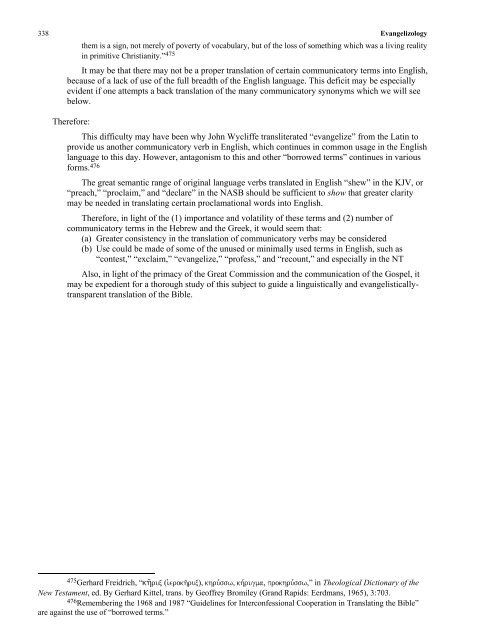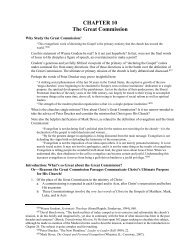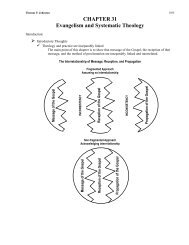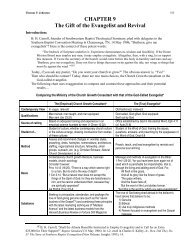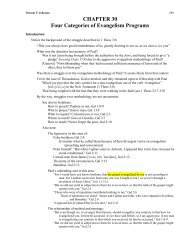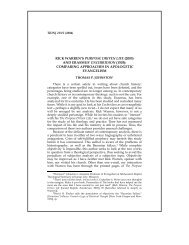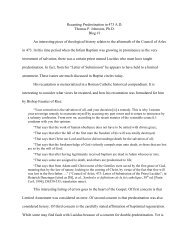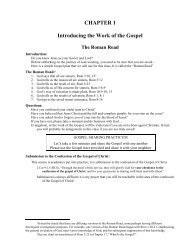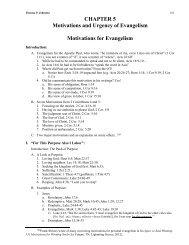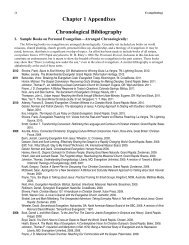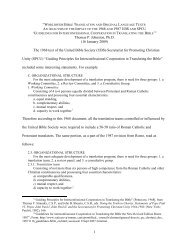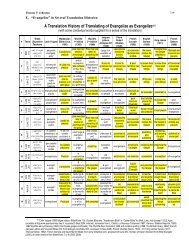338 Evangelizology them is a sign, not merely of poverty of vocabulary, but of the loss of something which was a living reality in primitive Christianity.” 475 It may be that there may not be a proper translation of certain communicatory terms into English, because of a lack of use of the full breadth of the English language. This deficit may be especially evident if one attempts a back translation of the many communicatory synonyms which we will see below. Therefore: This difficulty may have been why John Wycliffe transliterated “evangelize” from the Latin to provide us another communicatory verb in English, which continues in common usage in the English language to this day. However, antagonism to this and other “borrowed terms” continues in various forms. 476 The great semantic range of original language verbs translated in English “shew” in the KJV, or “preach,” “proclaim,” and “declare” in the NASB should be sufficient to show that greater clarity may be needed in translating certain proclamational words into English. Therefore, in light of the (1) importance and volatility of these terms and (2) number of communicatory terms in the Hebrew and the Greek, it would seem that: (a) Greater consistency in the translation of communicatory verbs may be considered (b) Use could be made of some of the unused or minimally used terms in English, such as “contest,” “exclaim,” “evangelize,” “profess,” and “recount,” and especially in the NT Also, in light of the primacy of the Great Commission and the communication of the Gospel, it may be expedient for a thorough study of this subject to guide a linguistically and evangelisticallytransparent translation of the Bible. 475 Gerhard Freidrich, “kh/rux (ièrokh/rux), khru,ssw, kh,rugma, prokhru,ssw,” in Theological Dictionary of the New Testament, ed. By Gerhard Kittel, trans. by Geoffrey Bromiley (Grand Rapids: Eerdmans, 1965), 3:703. 476 Remembering the 1968 and 1987 “Guidelines for Interconfessional Cooperation in Translating the Bible” are against the use of “borrowed terms.”
Thomas P. Johnston 339 G. Turning the Tide—Unleashing the Word Evangelize! A well-meaning acquaintance (with a Ph.D.) once told me, “The Gospels and the Book of Acts speak of evangelism, but it cannot be found in the epistles.” This statement, by a man of letters, exemplifies why the word evangelize needs to be unleashed in the Pauline letters. Indeed, the word euvaggeli,zw is found 21 times in the Pauline epistles. However, this learned man was unaware of that fact, as was I at the time. Notice above that 12 of the 24 translations of euvaggeli,zw in the French Olivétan version (i.e. proto-French Geneva Bible) are in the Pauline letters, while it is found only once the Book of Acts. It was obvious that this acquaintance was not reading the French Geneva Bible in his devotions! However, what if your Bible read like this? … Several OT precedents (of the 22 total OT LXX uses) of the verb euvaggeli,zw from the LXX (revising the NKJ): Psa 40:9, “I have evangelized righteousness In the great assembly; Indeed, I do not restrain my lips, O LORD, You Yourself know” Psa 68:11, “The Lord gave the word; Great was the company of those evangelizing” Psa 96:2, “Sing to the LORD, bless His name; Evangelize His salvation from day to day” Isa 40:9, “O Zion, You who evangelizes, Get up into the high mountain; O Jerusalem, You who evangelizes, Lift up your voice with strength, Lift it up, be not afraid; Say to the cities of Judah, ‘Behold your God!’” Isa 52:7, “How beautiful upon the mountains Are the feet of him who evangelizes, Who proclaims peace, Who evangelizes good, Who proclaims salvation, Who says to Zion, ‘Your God reigns!’” Isa 60:6, “The multitude of camels shall cover your land, The dromedaries of Midian and Ephah; All those from Sheba shall come; They shall bring gold and incense, And they shall evangelize the praises [LXX: ‘the salvation’] of the LORD” Isa 61:1, “The Spirit of the Lord GOD is upon Me, Because the LORD has anointed Me To evangelize the poor; He has sent Me to heal the brokenhearted, To proclaim liberty to the captives, And the opening of the prison to those who are bound” Joel 2:32 (revising Brenton), “And it shall come to pass that whosoever shall call on the name of the Lord shall be saved: for in mount Sion and in Jerusalem shall the saved one be as the Lord has said, and they that are evangelized, whom the Lord has called” Nahum 1:15, “Behold, on the mountains The feet of him who evangelizes, Who proclaims peace! O Judah, keep your appointed feasts, Perform your vows. For the wicked one shall no more pass through you; He is utterly cut off” The following translates euvaggeli,zw as evangelize in its 25 uses in Luke-Acts (10 in Luke and 15 in Acts), revising the NASB translation: Luke 1:19, “And the angel answered and said to him, “I am Gabriel, who stands in the presence of God; and I have been sent to speak to you, and to evangelize this thing.” Luke 2:10, “And the angel said to them, ‘Do not be afraid; for behold, I evangelize you a great joy which shall be for all the people.’” Luke 3:18, “So with many other exhortations also he [John the Baptist] evangelized the people.” Luke 4:18 (cf. Luke 7:22), “The Spirit of the Lord is upon Me, Because He anointed Me to evangelize the poor. He has sent Me to proclaim release to the captives, And recovery of sight to the blind, To set free those who are downtrodden.” Luke 4:43, “But He [Jesus] said to them, “I must evangelize the kingdom of God to other cities also, for I was sent for this purpose.” Luke 7:22, “And He answered and said to them, ‘Go and report to John what you have seen and heard: the blind receive sight, the lame walk, the lepers are cleansed, and the deaf hear, the dead are raised up, the poor are evangelized.’” Luke 8:1, “And it came about soon afterwards, that He began going about from one city and village to another, proclaiming and evangelizing the kingdom of God; and the twelve were with Him.” Luke 9:6, “And departing, they began going about among the villages evangelizing and healing everywhere.” Luke 16:16, “The Law and the Prophets were proclaimed until John; since then the gospel of the kingdom of God is evangelized, and everyone is forcing his way into it.” Luke 20:1, “And it came about on one of the days while He was teaching the people in the temple and evangelizing, that the chief priests and the scribes with the elders confronted Him.” Acts 5:42, “And every day, in the temple and from house to house, they kept right on teaching and evangelizing Jesus as the Christ.”
- Page 1 and 2:
Thomas P. Johnston 253 CHAPTER 7 De
- Page 3 and 4:
Thomas P. Johnston 255 4. Instead o
- Page 5 and 6:
Thomas P. Johnston 257 A. Select Hi
- Page 7 and 8:
Thomas P. Johnston 259 10. Seeker-S
- Page 9 and 10:
Thomas P. Johnston 261 c) The passa
- Page 11 and 12:
Thomas P. Johnston 263 c) Note some
- Page 13 and 14:
Thomas P. Johnston 265 b. Leading t
- Page 15 and 16:
Thomas P. Johnston 267 doctor is in
- Page 17 and 18:
Thomas P. Johnston 269 Unfortunatel
- Page 19 and 20:
Thomas P. Johnston 271 procurations
- Page 21 and 22:
Thomas P. Johnston 273 “…Cathol
- Page 23 and 24:
Thomas P. Johnston 275 4) SS, Q[10]
- Page 25 and 26:
Thomas P. Johnston 277 f. From 1273
- Page 27 and 28:
Thomas P. Johnston 279 i. Sample ar
- Page 29 and 30:
Thomas P. Johnston 281 contrary to
- Page 31 and 32:
Thomas P. Johnston 283 After first
- Page 33 and 34:
Thomas P. Johnston 285 with their t
- Page 35 and 36: Thomas P. Johnston 287 “This has
- Page 37 and 38: Thomas P. Johnston 289 c. James Gal
- Page 39 and 40: Thomas P. Johnston 291 Word and the
- Page 41 and 42: Thomas P. Johnston 293 Conversionis
- Page 43 and 44: Thomas P. Johnston 295 9. Evangelis
- Page 45 and 46: Thomas P. Johnston 297 1986 The Eva
- Page 47 and 48: Thomas P. Johnston 299 “As a resu
- Page 49 and 50: Thomas P. Johnston 301 During Billy
- Page 51 and 52: Thomas P. Johnston 303 On the Trans
- Page 53 and 54: Thomas P. Johnston 305 # Passage Pe
- Page 55 and 56: Thomas P. Johnston 307 # Passage Pe
- Page 57 and 58: Thomas P. Johnston 309 nations, fam
- Page 59 and 60: Thomas P. Johnston 311 D. A History
- Page 61 and 62: Thomas P. Johnston 313 Page of Gala
- Page 63 and 64: Thomas P. Johnston 315 Galatians 1
- Page 65 and 66: Thomas P. Johnston 317 1. One of th
- Page 67 and 68: Thomas P. Johnston 319 # Texts 1 2
- Page 69 and 70: Thomas P. Johnston 321 A Translatio
- Page 71 and 72: Thomas P. Johnston 323 A Translatio
- Page 73 and 74: Thomas P. Johnston 325 A Translatio
- Page 75 and 76: Thomas P. Johnston 327 #* Verse A S
- Page 77 and 78: Thomas P. Johnston 329 Comments: Wh
- Page 79 and 80: Thomas P. Johnston 331 F. On the Tr
- Page 81 and 82: Thomas P. Johnston 333 Notice, for
- Page 83 and 84: Thomas P. Johnston 335 Semantic Stu
- Page 85: Thomas P. Johnston 337 Verb “addr
- Page 89 and 90: Thomas P. Johnston 341 Gal 1:23,
- Page 91 and 92: Thomas P. Johnston 343 H. Arguments
- Page 93 and 94: Thomas P. Johnston 345 10. Because
- Page 95 and 96: Thomas P. Johnston 347 Likewise a p
- Page 97 and 98: Thomas P. Johnston 349 These exampl
- Page 99 and 100: Thomas P. Johnston 351 Therefore th
- Page 101 and 102: Thomas P. Johnston 353 TOWARD UNDER
- Page 103 and 104: Thomas P. Johnston 355 2 Tim 1:11,
- Page 105 and 106: Thomas P. Johnston 357 Greek Byzant
- Page 107 and 108: Thomas P. Johnston 359 Initiating t
- Page 109 and 110: Thomas P. Johnston 361 h. God as
- Page 111 and 112: Thomas P. Johnston 363 Chart of Ver
- Page 113 and 114: Thomas P. Johnston 365 5) evpagge,l
- Page 115 and 116: Thomas P. Johnston 367 Translations
- Page 117 and 118: Thomas P. Johnston 369 (d) Noun in
- Page 119 and 120: Thomas P. Johnston 371 (d) In his l
- Page 121 and 122: Thomas P. Johnston 373 Texts Rom 1:
- Page 123 and 124: Thomas P. Johnston 375 euvaggeli,zw
- Page 125 and 126: Thomas P. Johnston 377 Comparing Se
- Page 127 and 128: Thomas P. Johnston 379 3—TO TESTI
- Page 129 and 130: Thomas P. Johnston 381 (2) Can the
- Page 131 and 132: Thomas P. Johnston 383 l) For we ca
- Page 133 and 134: Thomas P. Johnston 385 Johnston Mod
- Page 135 and 136: Thomas P. Johnston 387 a) “And ac
- Page 137 and 138:
Thomas P. Johnston 389 transliterat
- Page 139 and 140:
Thomas P. Johnston 391 NIV (1984);
- Page 141 and 142:
Thomas P. Johnston 393 Byzantine Te
- Page 143 and 144:
Thomas P. Johnston 395 Byzantine Te
- Page 145 and 146:
Thomas P. Johnston 397 Thayer: “1
- Page 147 and 148:
Thomas P. Johnston 399 James Murdoc
- Page 149 and 150:
Thomas P. Johnston 401 b) sumbiba,z
- Page 151 and 152:
Thomas P. Johnston 403 Greek Latin
- Page 153 and 154:
Thomas P. Johnston 405 Young’s (1
- Page 155 and 156:
Thomas P. Johnston 407 Tyndale (153
- Page 157 and 158:
Thomas P. Johnston 409 Matt 13:3 An
- Page 159 and 160:
Jerome Vulgate (435) verbum vitae c
- Page 161 and 162:
Thomas P. Johnston 413 b) Other tha
- Page 163 and 164:
Thomas P. Johnston 415 Greek Byzant
- Page 165 and 166:
Thomas P. Johnston 417 Byzantine Te
- Page 167 and 168:
Thomas P. Johnston 419 Etheridge (1
- Page 169 and 170:
Thomas P. Johnston 421 121) oivkodo
- Page 171 and 172:
Thomas P. Johnston 423 Paul’s Met
- Page 173 and 174:
Thomas P. Johnston 425 20.14); in a
- Page 175 and 176:
Thomas P. Johnston 427 11—VERBS D
- Page 177 and 178:
Thomas P. Johnston 429 12—VERBS D
- Page 179 and 180:
Thomas P. Johnston 431 13—VERBS U
- Page 181 and 182:
Thomas P. Johnston 433 Passage Pers
- Page 183 and 184:
Thomas P. Johnston 435 (2) Also pro
- Page 185 and 186:
Thomas P. Johnston 437 4. SPIRITUAL
- Page 187 and 188:
Thomas P. Johnston 439 How differen
- Page 189 and 190:
Thomas P. Johnston 441 1) Other ver
- Page 191 and 192:
Thomas P. Johnston 443 Three IBS/AB
- Page 193 and 194:
Thomas P. Johnston 445 Acts 15:7,
- Page 195 and 196:
Thomas P. Johnston 447 3) pei,qw (p
- Page 197 and 198:
Thomas P. Johnston 449 Other intere
- Page 199 and 200:
Thomas P. Johnston 451 6) evpistre,
- Page 201 and 202:
Greek LXX (200 B.C.) Thomas P. John
- Page 203 and 204:
Thomas P. Johnston 455 3. MOVEMENT
- Page 205 and 206:
Thomas P. Johnston 457 Some thought
- Page 207 and 208:
Thomas P. Johnston 459 K. Concludin
- Page 209 and 210:
Thomas P. Johnston 461 Logical Impl
- Page 211 and 212:
Thomas P. Johnston 463 My translati
- Page 213:
Thomas P. Johnston 465


